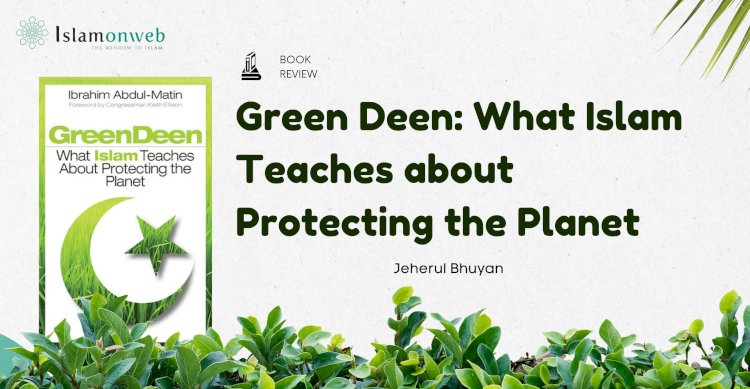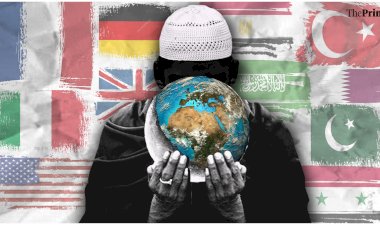Book Review: Green Deen: What Islam Teaches about Protecting the Planet
Green Deen: What Islam Teaches about Protecting the Planet is authored by Ibrahim Abdul-Matin, a policy advisor in the New York City Mayor’s Office focusing on long-term planning and sustainability. In this thought-provoking book, he explores the deep connections between Islamic teachings and environmental consciousness, addressing the subject from multiple dimensions.
The title Green Deen refers to an environmentally mindful way of life inspired by Islam, where deen in Arabic denotes a “path” or “way.” Abdul-Matin presents six core principles of what he terms a green deen: Tawḥīd (Oneness of God), Āyah (Signs of God), Khilāfah (Stewardship), Amānah (Trust), ʿAdl (Justice), and Mīzān (Balance). Each of these principles offers a framework through which Muslims can understand and engage with ecological responsibility.
The book is structured into four parts, focusing on waste, energy, water, and food—each examined through the lens of Islamic ethics. Central to the book’s message is the statement: “The Earth is a mosque, and everything in it is sacred.” This idea underscores the sacredness of nature and the responsibility humans bear as caretakers of the planet.
Overview of the Book
In the first part, titled Waste, Ibrahim Abdul-Matin addresses the issue of overconsumption and waste management. He draws on the Islamic principle of Mīzān (balance), urging moderation and responsible consumption to maintain the Earth's equilibrium and safeguard it for future generations. He also places strong emphasis on Tawḥīd (the Oneness of God and His creation), reminding readers that all resources are interconnected and originate from a single divine source. This theological foundation reinforces the necessity of moderation and conscious usage. Practical examples include community recycling initiatives and personal efforts to reduce waste. He further connects these ideas to the concept of ecological balance, often echoed in the Sustainable Development Goals (SDGs) highlighted in United Nations climate change frameworks.
In the second part, Watts, Abdul-Matin explores the energy crisis by contrasting non-renewable sources—what he calls “energy from hell”—with renewable alternatives, termed “energy from heaven.” Invoking the principle of Khilāfah (stewardship), he asserts that humans are entrusted by God to protect the planet, and thus must favour sustainable energy solutions. He stresses the responsibility to use energy resources wisely and advocates for investments in clean technologies such as solar and wind power.
The third part, Water, is examined through the lens of Āyāt (signs of God), emphasising that natural water sources are divine signs and their preservation is an act of reverence toward the Creator. He brings in the principle of ʿAdl (justice), highlighting the need for equitable access to clean water across all communities. Traditional Islamic practices, such as performing wuḍūʼ (ablution) with minimal water, are presented as examples of conservation and respect for this vital resource.
In the final part, Food, the discussion centres on dietary practices within the framework of Mīzān (balance), promoting habits that align with ecological sustainability and human health. Abdul-Matin discusses the importance of consuming ḥalāl (permissible) and ṭayyib (pure and wholesome) food—not only as a religious obligation but also as a means to encourage ethical farming practices and humane treatment of animals. This is linked to Amānah (trust), emphasising our responsibility to make food choices that support environmental integrity and social well-being.
Uniqueness of the Book
What sets Green Deen apart from other works in the field of environmental literature is its unique integration of Islamic theology with ecological advocacy. While many environmental texts approach the subject from scientific, economic, or general ethical standpoints, Ibrahim Abdul-Matin’s work delves into the spiritual imperatives embedded within Islamic principles.
From the analysis presented above, we can identify four key aspects that define the book’s distinctiveness:
- Faith-Based Environmentalism:
Abdul-Matin articulates how foundational Islamic principles—such as Tawḥīd (Oneness of God), Khilāfah (Stewardship), and Mīzān (Balance)—inherently guide Muslims towards sustainable living. This offers a unique lens where environmental care is not simply a moral or ethical choice, but a religious obligation rooted in one’s relationship with the Creator. - Cultural and Religious Context:
The book is deeply grounded in Islamic scripture and tradition, offering a rich tapestry of Qur’anic references and prophetic teachings. It illustrates how religious beliefs can shape and drive ecological consciousness, making the message both spiritually relevant and culturally resonant for Muslim readers. - Practical Applications Rooted in Faith:
Abdul-Matin goes beyond theory, offering practical steps for integrating environmental awareness into daily religious life. Simple actions—such as conserving water during wuḍūʼ (ablution) or choosing ethically sourced ḥalāl and ṭayyib food—are presented as means of fulfilling one’s duty to both faith and planet. - Community and Social Justice Focus:
The book highlights the importance of collective responsibility and social justice in environmental efforts. It reflects how Islamic teachings emphasise fair resource distribution, care for the less privileged, and maintaining the welfare of the entire community, framing ecological concern as a broader social obligation.
Green Deen: What Islam Teaches about Protecting the Planet is particularly well-suited for readers interested in the intersection of faith and environmentalism. For Muslims seeking to deepen their understanding of ecological stewardship within an Islamic framework, the book offers a compelling and spiritually rooted perspective. At the same time, individuals from other faiths or secular backgrounds will also find value in Abdul-Matin’s insights, as he illustrates how religious principles can effectively inform and inspire environmental action.
Ultimately, this book stands as a valuable resource for anyone looking to explore sustainable living through a spiritual lens—where caring for the Earth is not just a moral imperative but an act of faith.
About the author
Jeherul Bhuyan is an undergraduate student at Gauhati University, Assam. He is currently conducting research on resistance literature and identity assertion movements, with a special focus on the Miya Muslim community of Char-Chapori in the Brahmaputra Valley, at Darul Huda Islamic University.
References
- Abdul-Matin, Ibrahim. Green Deen: What Islam Teaches about Protecting the Planet. Berrett-Koehler Publishers, 2010.
- Book Review of "Green Deen: What Islam Teaches about Protecting the Planet". (n.d.). SoundVision.com.
- The Timeless Legacy of “The Green Deen”: An Exploration of Islam and Environmentalism. (n.d.).
Disclaimer
The views expressed in this article are the author’s own and do not necessarily mirror Islamonweb’s editorial stance.

























Leave A Comment